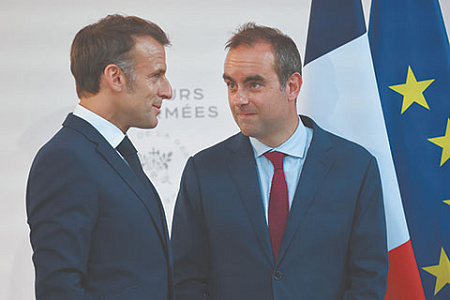
France is bracing for a period of profound social unrest, with trade unions calling for a massive nationwide strike on September 18th. An estimated 900,000 people are expected to participate in a protest against deeply unpopular austerity measures, prompting the Ministry of the Interior to deploy 80,000 law enforcement officers amid warnings of potential riots and vandalism.
The widespread anger is a direct response to the government’s attempts to pass a 2026 budget law featuring radical spending cuts. The measures are aimed at tackling France’s spiraling public debt, but they have ignited a political firestorm. The previous government, led by Prime Minister François Bayrou, collapsed after its proposal to cancel two public holidays to save money was met with furious public opposition and rejected by the National Assembly.
In the wake of this political turmoil, President Emmanuel Macron has appointed Sébastien Lecornu, the former Minister of Defense, as the new prime minister. In an attempt to quell public anger, Lecornu immediately scrapped the contentious holiday-cancellation plan. He also announced an end to lifelong perks for former government officials, a move widely seen as symbolic, as the savings of a few million euros are a drop in the ocean compared to the tens of billions needed to balance the budget.
The core of the crisis remains France’s dire economic situation. The nation’s public debt has soared to over €3.4 trillion, and in a major blow to its economic standing, Fitch Ratings recently downgraded France’s long-term credit rating to ‘A+’—the country’s worst-ever rating. The agency cited not only the ballooning debt, projected to hit 121% of GDP within two years, but also the persistent political instability undermining governance.
This instability is starkly illustrated by the rapid turnover in leadership; Lecornu is the seventh prime minister to serve under President Macron since 2017. His appointment is viewed as a strategic move to push the unpopular budget through, especially as Macron’s agenda is increasingly focused on military spending and aid to Ukraine. However, the new prime minister begins his tenure with a historically low approval rating of just 16%.
Analysts and political figures are sounding the alarm. Lecornu must navigate a treacherous path between far-left and far-right opposition in parliament to avoid a vote of no confidence. Former French President François Hollande has dubbed him the ‘last chance’ prime minister, underscoring the immense pressure he faces. A failure to pass the budget and stabilize the government could plunge France into one of its deepest political crises in recent memory.
